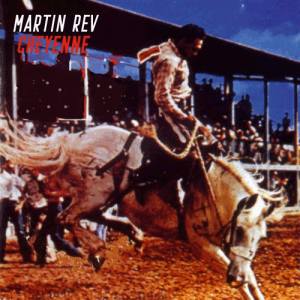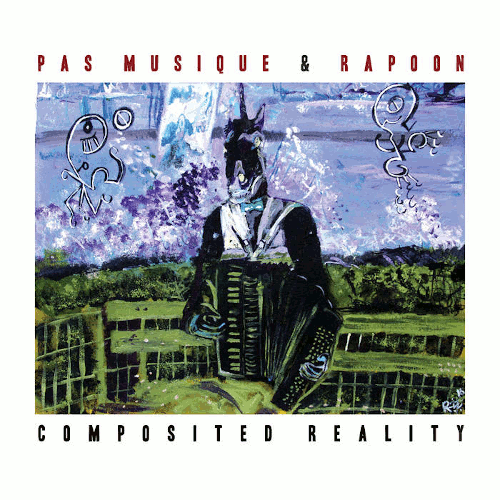 Martin Rev‘s renown in the history of electronic music from the early ’70s onwards is generally as one half of avant-doo-wop street synth rebels Suicide, but as well as constructing the beats and sounds for the duo, Martin also had a sporadic solo career, the second and third albums of which Bureau B are giving a well-earned re-issue.
Martin Rev‘s renown in the history of electronic music from the early ’70s onwards is generally as one half of avant-doo-wop street synth rebels Suicide, but as well as constructing the beats and sounds for the duo, Martin also had a sporadic solo career, the second and third albums of which Bureau B are giving a well-earned re-issue.
However, whereas there was a real air of oppression to the first Suicide album and a relentless street cool to the second, here the vibe is industrial and in Vega’s vacuum, the sounds of machinery, lifts and distant alarms take their place. The constant flow of seemingly endless sound samples makes for an incredibly engrossing alternative to vocals and one that sits well with his basic but intense rhythms, the clamour of noise endlessly repeating, generating synthetic mantras that work their way into your consciousness.
There is something irresistible about some of the rhythms; their simplicity and also their insistence, but also space is used to great effect at other points. “Rodeo” is jam-packed with metallic thrust but also fine attention to detail, while “Clouds Of Glory” is wider in scope, more stellar in its reach with fizzing ruptures and the synthetic attempt to evoke ancient organic structures. It is both modernist and futuristic at points, but we are also reminded of Martin’s early love of doo-wop and rock’n’roll. The mini cloudbursts and the washes of textured sound in “Metatron” are set against a real rock’n’roll rhythm, but one played on a cheap synth. It kind of sounds like it shouldn’t work, but the juxtaposition of the earthy beat and the impressionistic, inconclusive daubs of sound really does come across. Angelo Badalamenti must surely have been listening to this when he was writing some of the more romantic elements of the Twin Peaks soundtrack, because the atmosphere of “Whisper”, with its gently undulating synth, would fit perfectly into a Laura Palmer dream sequence. His ability to inject little repetitive motifs into the songs to add some focus to the overall sound is perfect on “Rocking Horse”, but all rhythm initially seems to be lost on “Parade”, with what sounds like an air bubble the only nod while a power generating razor hum lends and oddly sub-aquatic mood. This is the most ambient so far, and texturally is the sound of collapse, his attempts to distract you playing seriously with your concentration. Ironically, it would be six years before another Martin Rev album would appear, but the tracks thereon were mainly recorded in 1980, at the same time as the sessions for the second Suicide album. In fact, six of the original nine tracks are instrumental versions of tracks from that Suicide album that Martin chose to revisit and remaster on Cheyenne to see how they sounded vocal-less, and whether they could stand alone. Perhaps the surprising thing is that those tracks do work well without vocals, because as with Clouds If Glory, there is plenty of opportunity to concentrate on the electronic noises that Martin used to back up Alan’s voice.
Ironically, it would be six years before another Martin Rev album would appear, but the tracks thereon were mainly recorded in 1980, at the same time as the sessions for the second Suicide album. In fact, six of the original nine tracks are instrumental versions of tracks from that Suicide album that Martin chose to revisit and remaster on Cheyenne to see how they sounded vocal-less, and whether they could stand alone. Perhaps the surprising thing is that those tracks do work well without vocals, because as with Clouds If Glory, there is plenty of opportunity to concentrate on the electronic noises that Martin used to back up Alan’s voice.
There were three other tracks recorded at the time that are on here and the almost ambient opener “Wings Of The Wind” is kind of worth the admission alone. It does drift like the wind blowing through sun-filled canyons, those that are impossible to reach by foot, the sounds of space and stars, unhindered and unheard. It is a great opening and unexpected from the master of the insistent beat and the unexpected turn of events continues with “Little Rock”, which has a kind of Warriors vibe, with lots of seething atmosphere, all tinkling and distant hydraulics over drones. There is something akin to vocals, but they are unsure and seem to ebb and flow, flooding it with a solitary air.
When this album was originally released, it came with nine tracks, but when re-issued in 2008, a further three were added from a much later session in the nineties. These sit at odds, tacked on to the end of the album and are interesting experiments which seem to make use of the proprietary rhythm functions on a keyboard. They are fun, particularly the two-minute “Durango”, but essentially we are buying the album for the first nine tracks and they are well worth it. Martin Rev’s solo career was of more interest in some respects than that of Suicide, because his imagination and ideas had no bounds — whereas toward the end of the 1980s and beginning of the ’90s, the duo was tied irrevocably to its past.These two albums are great, and they sit perfectly with Bureau B’s desire to catalogue the history of the more esoteric side of electronic music.
-Mr Olivetti-


